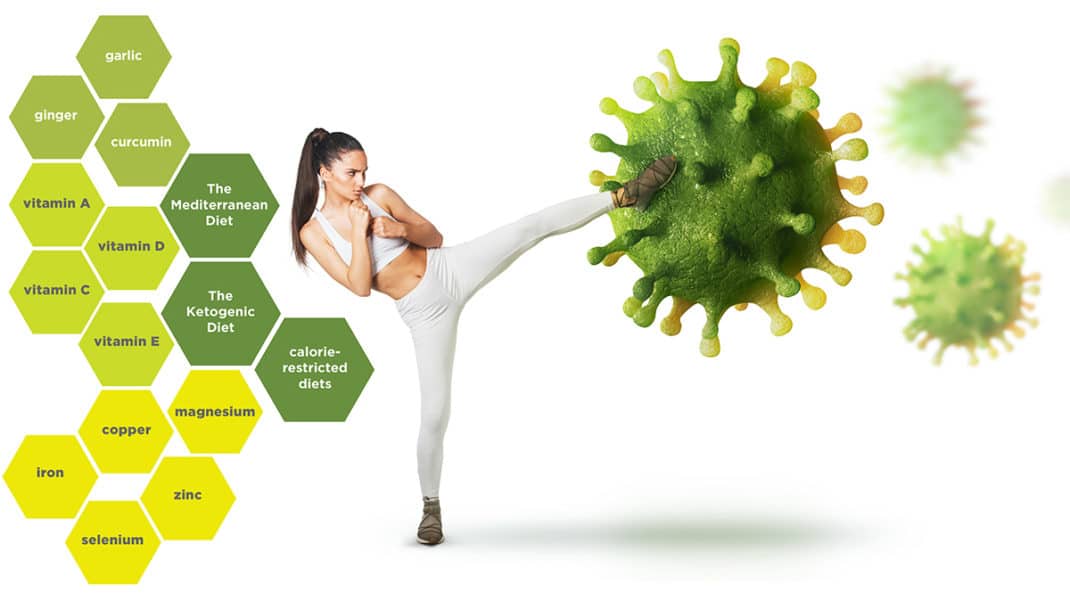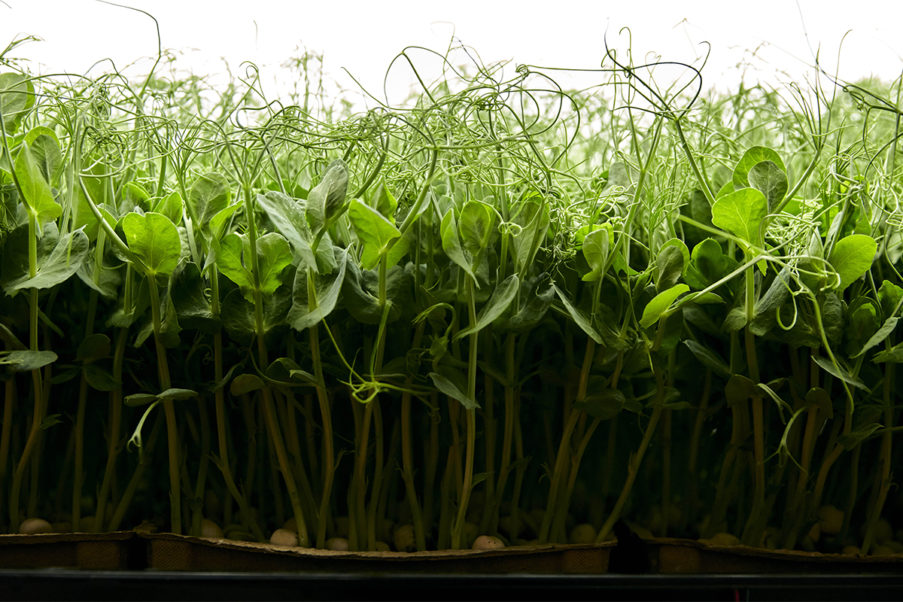Dietary Defenses and Nutrition for Immunity
Fortify yourself with this recent research review on the diets and food substances that can boost immunity.

Nutrition has a significant impact on immunity throughout the lifespan. In the womb, a child acquires passive immunity by getting antibodies through the placenta and, after birth, through nursing (Lokossou et al. 2022). Throughout the rest of a person’s life, dietary choices will continue to strongly influence various functions of the immune system, such as innate and adaptive responses (Tourkochristou, Triantos & Mouzaki 2021). (See “Innate, Adaptive and Inflammatory Systems: An Overview,” below, for more on these key terms.)
Adequate nutrition will fortify the body’s epithelial (barrier) membranes with trained immune cells, hold microbes and pathogens at harbors, and identify and eliminate abnormal tissue growths, or neoplasms.
Fitting diet and nutrition for immunity should contain foods and other active substances that are known to stimulate and balance immune responses. What follows is a discussion of several specific diets and nutrient powerhouses that offer immune-friendly effects.
Diets and Nutrition for Immunity
Unbalanced diets may have negative, undesirable effects on immunity. For example, the high incidence of immune-related disorders in Western countries is often linked to high calorie intake, excessive carbohydrates and saturated fats, and lack of fibers in the diet. However, several diets are considered to be very beneficial for the immune system.
The Mediterranean Diet
The Mediterranean diet, one of the most immune-friendly regimes, is defined by the high intake of plant-originated foods; a balanced consumption of dairy products, eggs and sea foods; and a limited intake of red meat and sweets. This diet provides a healthy omega-6 to omega-3 ratio, with omega-3 fats coming from fish and vegetables (such as green vegetables), as well as seeds and nuts (Casas, Sacanella & Estruch 2014).
Healthy and anti-aging properties of the Mediterranean diet might be related to its immunoregulatory and antiinflammatory effects, which are mediated by isoflavones, vitamins, minerals and omega-3 fatty acids (Di Danielle et al. 2017). Omega-3 fatty acids decrease inflammation by suppressing migration of white blood cells, their adhesion to the walls of blood vessels, and the release of pro-inflammatory (inflammation-promoting) molecules (Calder 2017).
Furthermore, extra virgin olive oil, one of the key components of the Mediterranean diet, contains large quantities of polyphenols known to quench inflammation due to their antioxidant and anti-inflammatory powers (Bonaccio et al. 2017).
See “Gut Microbiota and the Mediterranean Diet,” below, for how this nutritional approach may indirectly improve immunity.
The Ketogenic Diet
The ketogenic diet, which is characterized by low carbohydrate intake and high fat consumption, has been a part of several therapeutic strategies. This diet increases the intake of fatty acids and stimulates production of ketone bodies, which act as both a fuel source and immunoregulatory molecules.
For instance, ketone bodies show the capacity to decrease inflammation and therefore have a therapeutic potential for preventing and curing allergies and autoimmune disorders (Ang et al. 2020). In addition, a ketogenic diet may help to fight infections. In fact, there is evidence that it activates a specific subtype of lymphocytes in the lungs and thus strengthens protective immunity against the flu virus (Goldberg et al. 2019). On the other hand, a high-carbohydrate diet may stimulate immune cells in patients with inflammation and autoimmunity (Zhang et al. 2019).
Calorie-Restricted Diets
Although the effects of caloric restriction on the immune system have not been studied extensively, it is well known that obesity is a strong trigger of inflammation (Zhang et al. 2019). Currently available data points out that reduced food intake can regulate immune processes. For example, a moderate food restriction has been shown to activate T lymphocytes, which protect against infection and autoimmune inflammation (Ahmed et al. 2009; Okawa, Nagai & Hase 2021). In addition, calorie restriction may stimulate antitumor immunity (Pistollato et al. 2021). Furthermore, limiting calorie intake may help rejuvenate the immune system, as calorie restriction delays T lymphocyte deterioration in studies using nonhuman primates (Messaoudi et al. 2006).
One caveat: Despite the obvious benefits of moderate calorie restriction for the immune system, undernutrition may cause a severe immunodeficiency by suppressing the growth of immune cells, the production of antibodies and the process of phagocytosis, whereby cells engulf and digest other cells, including pathogens (Alwarawrah, Kiernan & MacIver 2018).
See also: Immunity: A Trend Worth Supporting
Individual Substances in Nutrition for Immunity

Surprisingly, the effects of spices are not limited to gustatory and olfactory pleasures: Our immunity can in fact be “spiced up” by their nutrients.
Spices, vitamins and minerals are among the powerhouses within nutrition for immunity.
Superior Spices
Spices were consumed by humans for centuries and deserve the close attention of dietitians and nutritionists. Surprisingly, the effects of spices are not limited to gustatory and olfactory pleasures: Our immunity can in fact be “spiced up” by their nutrients. For instance: Garlic can regulate immune homeostasis by activating immune cells and regulating the production of bioactive molecules (Melguizo-Rodriguez et al. 2022).
Ginger, another phytonutrient, acts as an antioxidant and anti-inflammatory nutrient and therefore can potentially be used for inflammatory disorders.
Curcumin, a yellow-hued spice obtained from Curcuma longa (turmeric) plants, has been found to suppress pro-
inflammatory T lymphocytes and the production of pro-inflammatory molecules (Tripathy et al. 2021).
Vivid Vitamins
In the kaleidoscope of immunoregulatory molecules, vitamins have a vital place, as vitamin deficiencies in plasma concentrations can dramatically suppress the immune functions (Djukic et al. 2014). Multiple nutritional and clinical studies have identified vitamins that may boost the defense mechanisms of the human body. Among them:
Vitamin A. Vitamin A is found in both fruits and vegetables and regulates both innate and adaptive immunity (Stephensen 2001). Carrots, mangoes, spinach, apricots, sweet potatoes and squash provide the best supply of vitamin A (Huang et al. 2018).
Vitamin C. Powerful antioxidant and immunostimulatory functions characterize vitamin C, which is present in many fruits and veggies (Carr & Maggini 2017). Some of the highest stores are found in citrus fruits, kiwifruit, strawberries, tomatoes and white potatoes, as well as in crucifers like broccoli, cauliflower, cabbage and Brussels sprouts (HSPH 2020).
Vitamin D. Interestingly, vitamin D possesses both immunostimulatory and immunosuppressive effects (Athanassiou, Mavragani & Koutsilieris 2022). In addition, vitamin D blocks inflammatory pathways and therefore prevents inflammation (Trochoutsou et al. 2015). Specific sources include cod liver oil, fish (salmon, swordfish, tuna, sardines), D-fortified juices and milks, fortified cereals, egg yolks and beef liver (HSPH 2022).
Vitamin E. Green leafy vegetables and dried fruits are a source of vitamin E, which stimulates immune responses and decreases infections in the elderly (Reider et al. 2020).
Remarkable Minerals
The supply of minerals is highly valuable for the functioning of both the innate and adaptive immune system, including antimicrobial defense mechanisms and the long-term balance of pro- and anti-inflammatory regulation. In particular, lack of copper, iron, magnesium, selenium and zinc in the diet may diminish the immune response.
Copper. Small quantities of copper are needed for many physiological functions, and balancing copper in the body helps to enrich immune responses. In line with this, copper deficiency appears if the daily intake falls below 0.8 mg/day and causes reduced antibody production and cellular immunity. The most significant sources of copper are liver, shellfish, nuts, vegetables and mushrooms (Altarelli et al. 2019).
Iron. The most common nutrient deficiency is iron-deficiency anemia, which affects approximately 25% of the world’s population and is caused by an insufficient supply of iron (Coad & Conlon 2011). Deficiency of this mineral impairs proliferation of B lymphocytes, decreases antibody production and inhibits function of the T lymphocytes (Mullick et al. 2006; Jiang et al. 2019). Iron supports the development and functions of both red and white blood cells. Meat, fish, chicken, seafood, legumes, eggs and vegetables can be named among the top food sources of iron (Beck et al. 2021).
Magnesium. Magnesium regulates many functions of the immune system, such as innate and adaptive immune responses and inflammation. For instance, by affecting macrophages, the key cells of the innate immune system, magnesium supplementation decreases production of pro-inflammatory molecules and therefore suppresses inflammation (Sugimoto et al. 2012). As to the adaptive immune system, magnesium directly influences the growth and differentiation of the lymphocytes (Feske, Skolnik & Prakriya 2012). Good sources of magnesium include spinach, oats, nuts, potatoes and lentils (Volpe 2013).
Selenium. Sufficient selenium is required for the immune system, as proteins containing selenium also regulate inflammatory responses (Huang, Rose & Hoffman 2012). Oats, wheat, brown rice, sunflower seeds, nuts and mushrooms are the foods that are especially rich in selenium. In addition, meat, tuna, salmon and shellfish are selenium-enriched foods of animal origin (Kieliszek 2019).
Zinc. The protective function of zinc as an anti-inflammatory microelement has been extensively documented (Planeta Keep 2022). Zinc is directly involved in the maintenance of both the innate and the adaptive immunity. As a result, having an adequate supply of zinc may shield people from viral infections by preventing viruses from entering their tissues and growing in their cells (Read et al. 2019). Among plant foods, wild rice, pasta, oats, chickpeas and spinach are especially rich in zinc. In ad-
dition, oysters and dairy products are good sources of zinc (Murphy, Willis & Watt 1975).
See also: Helping Clients Enjoy the Taste and Culture of Food
Can Diets Prevent and Cure?
Can a diet have both preventive and therapeutic effects for immune-mediated diseases, such as allergies and autoimmunity? Based on the latest research, the answer is yes. Here are a few specific examples.
Allergies. Multiple studies have shown that a healthy diet helps prevent allergic reactions in infancy. Both increased nutritional diversity and allergen diversity during the first year of life correlate with the diminished risk of food allergies over the first 10 years of a child’s life (Venter et al. 2020a).
Autoimmune disorders. Plant-based nutrition for immunity, such as Mediterranean and vegetarian diets, provides anti-inflammatory nutrients, which might protect against autoimmunity (Estruch 2010). For instance, quercetin, found in onions and garlic, shows potent anti-inflammatory and antioxidant effects (Azeem et al. 2022).
Furthermore, antioxidant vitamins A, D and E might be helpful in suppressing autoimmune reactions. Clinical studies have found a link between vitamin D deficiency and the development of autoimmune diseases (Athanassiou, Mavragani & Koutsilieris 2022).
Viral infections and infectious diseases. Nutritional activation of the immune system might be beneficial for prevention and, perhaps, treatment of viral infections (Calder et al. 2020). Primarily, fruits and vegetables provide a plethora of vitamins, minerals and other active nutrients, which give our immune system the strength to resist microbial infections.
Also, antimicrobial activity of different plants and herbs, such as garlic, ginger and black pepper, might be beneficial for prevention of infectious diseases via activation of the immune cells (Singh et al. 2021).
See also: The Food-Inflammation Connection
Connecting the Dots in Nutrition for Immunity
Additional studies are required to understand the effects of various diets and nutrients on the immune system and allow disease-specific dietary strategies to be developed with high certainty. Still, overall, the close connection between nutrition and immunity provides an exceptional possibility to create individual therapeutic approaches to prevent and cure immune, infectious and other diseases.
Healthy and immune-friendly diet plans and individual active substances, such as spices, vitamins and minerals, may ameliorate inflammation and positively modify the immune status. While more research is needed, today’s findings provide fitness and nutrition professionals with yet another set of benefits to help them encourage healthier eating among clients.
Innate, Adaptive and Inflammatory Systems: An Overview
The innate immune system is a barrier system that includes the skin and mucous membranes, and its goal is to prevent pathogens from entering the body. If the innate immune system is ineffective or only partially effective, the adaptive immune system responds, producing antibodies and lymphocytes (a special type of immune cells) to destroy the invaders. When the body senses an invader, immune cells flood the area, where they release substances meant to be protective but which can cause swelling, better known as inflammation (NIH 2020). Low-grade (chronic) inflammation is a recognized risk factor of many chronic diseases including cancer, cardiovascular and cerebrovascular diseases, and neurodegenerative conditions (Bonaccio et al. 2017).
Gut Microbiota and the Mediterranean Diet
Microbiota, the faithful bacteria inhabitating our guts, are strongly influenced by nutrition and may regulate the development and functions of the immune system. Recent research has shown that an improper balance of microbiota may cause various chronic diseases. But can the immune-friendly behavior of microbiota be regulated by a diet?
The Mediterranean diet, one of the most popular healthy diets, can affect the composition of the microbiota by increasing beneficial bacteria, suppressing pathogenic microorganisms and reducing inflammation (Lopez-Legarrea et al. 2014).
In addition, a high consumption of fiber, which is specific for the Mediterranean diet, influences the gut microbiota by changing the ratio of “good” and “bad” organisms and their activity. This indirectly impacts the body’s immune response in a positive way (Venter et al. 2020b). Notably, dietary fibers can be fermented by the gut microbiota and reduce inflammation.
References
Ahmed, T., et al. 2009. Calorie restriction enhances T-cell-mediated immune response in adult overweight men and women. The Journals of Gerontology. Series A, Biological Sciences and Medical Sciences, 64 (11), 1107–13.
Altarelli, M., et al. 2019. Copper deficiency: Causes, manifestations, and treatment. Nutrition in Clinical Practice, 34 (4), 504–13.
Alwarawrah, Y., Kiernan, K., & MacIver, N.J. 2018. Changes in nutritional status impact immune cell metabolism and function. Frontiers in Immunology, 9 (1055).
Ang, Q.Y., et al. 2020. Ketogenic diets alter the gut microbiome resulting in decreased intestinal Th17 cells. Cell, 181 (6), 1263–75.e16.
Athanassiou, L., Mavragani, C.P., & Koutsilieris, M. 2022. The immunomodulatory properties of vitamin D. Mediterranean Journal of Rheumatology, 33 (1), 7–13.
Azeem, M., et al. 2022. An insight into anticancer, antioxidant, antimicrobial, antidiabetic and anti-inflammatory effects of quercetin: A review. Polymer Bulletin: doi:10.1007/s00289-022-04091-8.
Beck, K.L., et al. 2021. Micronutrients and athletic performance: A review. Food and Chemical Toxicology, 158, 112618.
Bonaccio, M., et al. 2017. Mediterranean diet, dietary polyphenols and low grade inflammation: Results from the MOLI-SANI study. British Journal of Clinical Pharmacology, 83 (1), 107–13.
Calder, P.C. 2017. Omega-3 fatty acids and inflammatory processes: From molecules to man. Biochemical Society Transactions, 45 (5), 1105–15.
Calder, P.C., et al. 2020. Optimal nutritional status for a well-functioning immune system is an important factor to protect against viral infections. Nutrients, 12 (4), 1181.
Carr, A.C., & Maggini, S. 2017. Vitamin C and immune function. Nutrients, 9 (11), 1211.
Casas, R., Sacanella, E., & Estruch, R. 2014. The immune protective effect of the Mediterranean diet against chronic low-grade inflammatory diseases. Endocrine, Metabolic & Immune Disorders Drug Targets, 14 (4), 245–54.
Coad, J., & Colon, C. 2011. Iron deficiency in women: Assessment, causes and consequences. Current Opinion in Clinical Nutrition and Metabolic Care, 14 (6), 625–34.
Di Daniele, N., et al. 2017. Impact of Mediterranean diet on metabolic syndrome, cancer and longevity. Oncotarget, 8 (5), 8947–79.
Djukic, M., et al. 2014. Vitamin D deficiency reduces the immune response, phagocytosis rate, and intracellular killing rate of microglial cells. Infection and Immunity, 82 (6), 2585–94.
Estruch, R. 2010. Anti-inflammatory effects of the Mediterranean diet: The experience of the PREDIMED Study. Proceedings of the Nutrition Society, 69 (3), 333–40.
Feske, S., Skolnik, E.Y., & Prakriya, M. 2012. Ion channels and transporters in lymphocyte function and immunity. Nature Reviews Immunology, 12 (7), 532–47.
Goldberg, E.L., et al. 2019. Ketogenic diet activates protective γδ T cell responses against influenza virus infection. Science Immunology, 4 (41), eaav2026.
HSPH (Harvard T.H. Chan School of Public Health). 2020. Vitamin C. Accessed Sep. 3, 2022: hsph.harvard.edu/nutritionsource/vitamin-c/.
HSPH. 2022. Vitamin D. Accessed Sep. 3, 2022: hsph.harvard.edu/nutritionsource/vitamin-d/.
Huang, Z., et al. 2018. Role of vitamin A in the immune system. Journal of Clinical Medicine, 7 (9), 258.
Huang, Z., Rose, A.H., & Hoffmann, P.R. 2012. The role of selenium in inflammation and immunity: From molecular mechanisms to therapeutic opportunities. Antioxidants & Redox Signaling, 16 (7), 705–43.
Jiang, Y., et al. 2019. Iron-dependent histone 3 lysine 9 demethylation controls B cell proliferation and humoral immune responses. Nature Communications, 10 (2935).
Kieliszek, M. 2019. Selenium-fascinating microelement, properties and sources in food. Molecules, 24 (7), 1298.
Lokossou, G.A.G., et al. 2022. Human breast milk: From food to active immune response with disease protection in infants and mothers. Frontiers in Immunology, 13 (849012).
Lopez-Legarrea, P., et al. 2014. The influence of Mediterranean, carbohydrate and high protein diets on gut microbiota composition in the treatment of obesity and associated inflammatory state. Asia Pacific Journal of Clinical Nutrition, 23 (3), 360–68.
Melguizo-Rodríguez, L., et al. 2022. Biological properties and therapeutic applications of garlic and its components. Food & Function, 13 (5), 2415–26.
Messaoudi, I., et al. 2006. Delay of T cell senescence by caloric restriction in aged long-lived nonhuman primates. Proceedings of the National Academy of Sciences USA, 103 (51), 19448–53.
Mullick, S., et al. 2006. Impact of iron deficiency anaemia on T lymphocytes & their subsets in children. Indian Journal of Medical Research, 124 (6), 647–54.
Murphy, E.W., Willis, B.W., & Watt, B.K. 1975. Provisional tables on the zinc content of foods. Journal of the American Dietetic Association, 66 (4), 345–55.
NIH (National Institutes of Health). 2020. The innate and adaptive immune systems. InformedHealth.org. Accessed Sep. 1, 2022: ncbi.nlm.nih.gov/books/NBK279396/.
Okawa, T., Nagai, M., & Hase, K. 2021. Dietary intervention impacts immune cell functions and dynamics by inducing metabolic rewiring. Frontiers in Immunology, 11, 623989.
Pistollato, F., et al. 2021. Effects of caloric restriction on immunosurveillance, microbiota and cancer cell phenotype: Possible implications for cancer treatment. Seminars in Cancer Biology, 73, 45–57.
Planeta Keep, K. 2022. Bioinorganic chemistry of zinc in relation to the immune system. ChemBioChem, 23 (9), e202100554.
Read, S.A., et al. 2019. The role of zinc in antiviral immunity. Advances in Nutrition, 10 (4), 696–70.
Reider, C.A., et al. 2020. Inadequacy of immune health nutrients: Intakes in US adults, the 2005–2016 NHANES. Nutrients, 12 (6), 1735.
Singh, N.A., et al. 2021. Spices and herbs: Potential antiviral preventives and immunity boosters during COVID-19. Phytotherapy Research, 35 (5), 2745–57.
Stephensen, C.B. 2001. Vitamin A, infection, and immune function. Annual Review of Nutrition, 21, 167–92.
Sugimoto, M., et al. 2012. Non-targeted metabolite profiling in activated macrophage secretion. Metabolomics, 8, 624–33.
Tourkochristou, E., Triantos, C., & Mouzaki, A. 2021. The influence of nutritional factors on immunological outcomes. Frontiers in Immunology, 12, 665968.
Tripathy, S., et al. 2021. Curcumin extraction, isolation, quantification and its application in functional foods: A review with a focus on immune enhancement activities and COVID-19. Frontiers in Nutrition, 8, 747956.
Trochoutsou, A.I., et al. 2015. Vitamin-D in the immune system: Genomic and non-genomic actions. Mini-Reviews in Medicinal Chemistry, 15 (11), 953–63.
Venter, C., et al. 2020a. Different measures of dietary diversity during infancy and the association with childhood food allergy in a UK birth cohort study. The Journal of Allergy and Clinical Immunology: Practice, 8 (6), 2017–26.
Venter, C., et al. 2020b. Nutrition and the immune system: A complicated tango. Nutrients, 12 (3), 818.
Volpe, S.L. 2013. Magnesium in disease prevention and overall health. Advances in Nutrition, 4 (3), 378S-83S.
Zhang, D., et al. 2019. High glucose intake exacerbates autoimmunity through reactive-oxygen-species-mediated TGF-β cytokine activation. Immunity, 51 (4), 671–81.e5.




